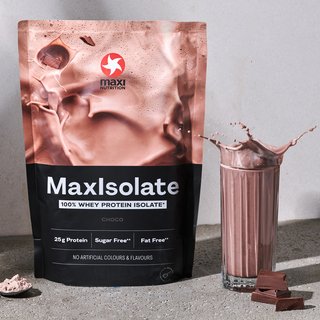Protein – of prime importance
Protein is one of the fundamental macronutrients required by the body. The word protein derived from the Greek word Proteios – meaning of prime importance. Aside from being an energy source, protein performs a number of key roles, from cell and hormone production to the growth of hair, bone and nails. Protein is essential for muscle maintenance, repair and growth. Dietary protein comes from the foods we eat and are naturally present in plant and animal sources. The big question though - is one source of protein better than another? We have enlisted the support of our resident nutritionist, Gareth Nicholas, to unravel the world of protein.
Protein is protein
In it’s pure energy form, protein is protein, but dietary sources of protein contain other nutrients and vary in their protein structure (the amino acids mix). As such, our protein sources should be considered to include the other nutrients they provide, along with total amount of protein available and the biological availability. To explain further, see the table below that compares a number of protein foods.
Food & Amount of protein |
Other nutrients to consider per serving |
Absor. rate (g/h) |
Bio. value % |
|
Egg6g per egg |
5g Fat (1.61g Saturated fat)207mg CholesterolHigh in vitamin A, D, E, K, & B vitaminsHigh in Choline |
~3 |
100 |
|
Beef31g per 113g steak (4oz) |
16g Fat (6.4g Saturated fat)104mg CholesterolHigh in IronRich in B VitaminsSource of Zinc, Selenium, Phosphorous & Potassium |
~2 |
80 |
|
Chicken31g per 100g |
4g Fat (1g Saturated fat)84mg CholesterolVitamin B3, B6 & Phosphorous |
~2 |
79 |
|
Whole Milk8g per 250ml |
8g Fat (5g Saturated fat)12g SugarCalcium, B12, Riboflavin & Phosphorous |
~3.5 |
90 |
|
Soya Milk8g per 250ml |
4g Fat10g SugarB12, Riboflavin, Iodine & Calcium |
~3.5 |
96 |
|
Whey Protein Isolate – MaxIsolate25g per 30g |
Fat and Sugar FreeHigh in Vitamin B6Calcium |
~9 |
104 |
|
As you can see from the table above, the best source of protein depends on the exact question you ask. Just focusing on the numbers - the bioavailability, rate of absorption and quantity of protein per 100g. You can understand why many people view Whey Protein Isolate (WPI) as the champion of proteins. And yes, if you have a gap in your diet that needs filling with protein, then WPI would be a pretty good choice. But it doesn’t have to be the only choice, and don’t get fooled by thinking that you should be solely consuming WPI or that if some is good, then more must be better. Below is a few myths and facts to help you decipher the world of protein.
Myth or Fact
1. Myth: When it comes to protein there’s no limit. More is better! Fact: Protein consumption should be based by body weight. The reference intake for protein is 0.8g per kg of body weight per day.
2. Myth: When building muscle consume upwards of 2.5g of protein per kg of body weight per day. Fact: Protein needs to be broken down into its amino acids to be absorbed. The rate that this happens is the limiting factor, along with the livers capacity to produce ammonia and urea. The upper limit is still quite high, but equates to a daily protein intake of 2.2g of protein per kg of body weight per day.
3. Myth: Excess protein is just excreted Fact: Excess urea (nitrogen) is excreted, but the excess energy from protein may be converted and stored as body fat.
4. Myth: There’s nothing wrong with having too much protein. Fact: The body is capable of coping with very large protein intakes, however the liver and kidneys are responsible for amino acid oxidation and excretion. Too much protein could prolong the work of both organs and can result in conditions as kidney stones.
5. Myth: Consuming big protein portions less frequently is best. Fact: The rate of absorption is crucial. For example, it would take approximately 3 hours to fully utilise a WPI shake (~9g/h). You should aim to consume 0.4g of protein per kg of body weight per meal (32g of protein per meal for an 80kg individual). That would equate to 5 meals to achieve 2g of protein per kg of bodyweight per day. Of course one or part of those meals could be a MaxIsolate shake.
6. Myth: Additional protein is stored for later Fact: The human body is unable to store protein. Once protein is broken down into its amino acids some are oxidised in the liver and some within the muscle to help fuel muscle growth.
Protein made simple
Without gauges and dials, like in a car, we are unable to see where the protein we consume is within the cycle. Is it still being digested, has it been broken down into the amino acids, what is the size of the pool of free amino acids, what is the rate of absorption, is the liver currently working at full capacity. So many questions and processes that can make this a complicated and confusing subject but keep it simple. Your diet should be macronutrient balanced, meaning that you have enough carbohydrate, protein and fat. This of course, is all based on what you are doing, your desired goal, your genetics and your nutrient processing efficiency. Put simply, aim to consume at between 0.8-2.2g of protein per kg of body weight per day. If possible, try to consume protein in small meals of 0.4g of protein per kg of body weight, every few hours. Remember the immortal words of goldilocks – not too much, not too little, just right!
Try MaxIsolate today
As you have now discovered, a range or variety of proteins in your diet is the best approach and probably more realistic, but if you want to have a protein powder by your side to fill those dietary gaps or perhaps maximise on your protein opportunities – MaxIsolate is an excellent choice. Free from fat and sugar, less than 115 kcal per serving, 100% rapidly absorbing whey isolate (25g per serving) and with added vitamin B6. MaxIsolate would make a great nutrition partner for your diet.
















